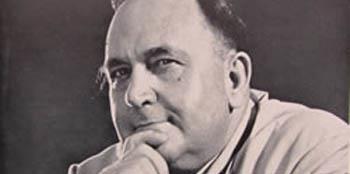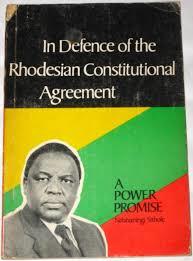Two Tragic Figures
19 January 2023

|
|
It is often said that Ian Smith was the first native-born Rhodesian prime minister, but this is not entirely true. Roy Welensky, the last Federal PM, was also born in Rhodesia, and to humble origins. In his early years, he boxed to supplement his income as a railroad worker, eventually becoming Rhodesian heavyweight champion. To the end of his days, despite his knighthood and his three-piece suits, he never lost the air of someone who might clock you one if you made him angry. And he was often angry.
The British reviled Ian Smith as “parochial,” a “farmhand,” and a “fascist cowboy.” The party he ended up leading, the Rhodesian Front, were considered extremists compared to the older and more august United Federal Party, the ruling party of the Federation. Smith’s cardinal sin however, was signing Rhodesia’s Unilateral Declaration of Independence in 1965.
Yet in many ways it was Welensky who inspired UDI and mentored the fledgling RF. According to Robert Blake, as early as 1958, Welensky went so far as to ask his attorney general “about the consequences of ‘a Boston Tea Party’.” Then, in 1962:
Not for the first time he toyed with the idea of a Federal UDI... he wondered whether the time had arrived for him to break with Britain entirely and to suggest that the Federation should henceforth go it alone.
Smith was impressed by Welensky’s speeches, but saw the chance for independence slipping away. Of Rhodesian politicians of this period, Smith writes:
...there was not one who inspired me as having those qualities needed in an emergency, when a stand has to be made on principle. There was a time when I thought Welensky might — but I was beginning to have doubts even about him.
Because he was knighted, and probably in part because he was not ethnically English, Welensky felt a particular loyalty to the British establishment. But probably of more importance was simply that he was slightly older than most of the RF crowd. He had come of age when the British Empire still meant something that it no longer did. He could describe and criticize how it had changed, but he was powerless to shake free of the hold it had on him.
Another reason for Welensky’s hesitation was that his chief concern was not Southern Rhodesia, but the Federation.
In the south, black Africans had for several generations had some opportunity to gain some kind of “stake” in the country. At least some black people voted, had become prosperous in business under the Rhodesian system, or served in the armed forces, and you had the support of the chiefs. In fact, in the south, many whites had misgivings about federation for fear it would weaken their government. And the British Monckton Commission of 1960 found that some Southern Rhodesian blacks supported the Federation as a counterweight to white rule and wanted the Federal government to take over more government functions. But black support in the north had proven unobtainable during the prosperous Federal period. As the same Monckton Commission put it: “the dislike of the Federation among Africans in the two Northern Territories is widespread, sincere and long standing. It is almost pathological.”
Welensky could not have supported independence for Southern Rhodesia before 1963 since that would have undermined the Federation. He still had ambitious plans for the Federation and wanted to expand it beyond the borders of just Nyasaland and the Rhodesias. Where others saw disaster in the fall of neighboring countries to communism, Welensky saw opportunity in forming alliances with anti-communist rebels and even annexing adjacent territories to the CAF, making it into a sort of a United States of Central Africa. In a way he was visionary, as indeed some of these countries later descended into civil war between communist and anti-communist factions. But it was too late for the Federation.
As Federal PM he had dared the British: “Let them send their troops... we won’t start the fighting but we are ready if they do.” But the British never sent any troops, they simply announced that Northern Rhodesia and Nyasaland were to become independent and so the Federation was at an end. When the news was conveyed to him, he turned down an invitation for his delegation to dine at 10 Downing Street because “the food would choke them.”
Welensky then advised Southern Rhodesian prime minister Winston Field not to attend the 1963 Victoria Falls conference to negotiate the terms of the break-up unless the British first publically assured him of independence as they had assured Northern Rhodesia and Nyasaland. But Field was pressured into attending without such an assurance. From this point on there was no question that Smith was the only man who could and would do the job.
When Welenksy saw the real end coming to the connection between Rhodesia and Britain, he openly opposed the RF and its UDI policy. In 1964, he attempted to reenter politics and ran in a by-election for an open seat in a Salisbury district. He had never had a constituency in Southern Rhodesia, true, but this was the man who less than two years earlier had been prime minister of the entire Federation. He failed to win the seat, the first of many political casualties to the RF juggernaut.

|
|
Ndabaningi Sithole was one of the original founders of both ZAPU, until he was pushed out of it by Joshua Nkomo in 1963, and ZANU, until he was pushed out of it by Robert Mugabe in 1975. He was a minister in the Methodist Church and a committed black nationalist who advocated the overthrow of the Rhodesian government by force. He was less flamboyant than Nkomo, less authoritarian than Mugabe, and probably more intellectual than both.
After Mugabe consolidated control over ZANU, Sithole renounced violence and returned to Rhodesia to sign the “Internal Settlement” convened by Ian Smith in early 1978. This made him part of a four-man “Executive Council” consisting of him, Smith, Abel Muzorewa, and Jeremiah Chirau. The four acted as a sort of a collective prime ministership until elections were held the following year.
Voters approved a new constitution in early 1979 guaranteeing universal suffrage in Rhodesia for the first time. The four members of the council toured the world, attempting to secure diplomatic recognition for the country under the new constitution and removal of the sanctions that had been imposed on them since 1965. No country recognized them and sanctions were not lifted.
The war also escalated. Mugabe now dominated ZANU and was launching more and larger attacks into Rhodesia from Mozambique. Rhodesia responded by escalating air raids and cross-border reprisals on rebel camps to bring pressure on Mozambican president Samora Machel to reign in ZANU.
Similar attacks on Zambia yielded some success in getting Zambian president Kenneth Kaunda to convince ZAPU leader Joshua Nkomo to consider a negotiated end to the war. Smith says he held “numerous discussions” with Nkomo to try to get him to join the Internal Settlement. Apparently Nkomo was wary to agree to this before Mugabe did.
The four also toured the country individually on their respective campaign efforts for the upcoming elections.
The final results gave Muzorewa’s UANC a full two thirds of the popular vote, with the RF and Sithole’s splinter faction of ZANU as minority parties. Chirau’s party got no seats. A Matabele party led by Chief Khayisa Ndiweni won several seats in Matabeleland, a harbinger of the quest for Matabele autonomy that was to be suppressed by Mugabe in coming years.
The reason Sithole, a leading name in black nationalism in Rhodesia for 20 years, did so poorly in the 1979 election may be because he had returned to the country little more than a year earlier. Muzorewa had emerged as a leader in 1972 when he led UANC in opposition to the Home-Smith proposals. Muzorewa’s stature within the country had since grown and he had built up his organization. He had boycotted the voting system under the qualified franchise, but he had learned to wield power through peaceful protest. Sithole’s entire career had been as a militant, and he was now devoid of a military organization to back him up. He was probably slow to adapt to legal politics and his stature must have seemed diminished in light of his past reputation.
The reason the rest of the world, led by Britain which still “owned” the Rhodesian issue, did not recognize the Internal Settlement nor the 1979 constitution and elections was not because a quarter of parliamentary seats had been reserved for white people. The Lancaster House agreement of 1980 which the British engineered had this feature too. They objected because ZAPU under Nkomo and ZANU under Mugabe had not been included. Smith recalls from a press conference in Washington D.C. during this period:
There were two gentlemen sitting at the side of the table who, we subsequently discovered, were from the British embassy. One made the point that we could not claim that the existing government truly represented black opinion because Nkomo and his party were not represented. Sithole came back, pointing out that both Nkomo and Mugabe had been invited to participate in the transitional government and had been offered seats on the executive council — who was holding them back?
After Lancaster House, as Smith saw it: “There were two main problems standing in the way of Mugabe’s dream of general consensus for his one-party state: the Matabele and the white man.” He tried to convince Nkomo that he could not win a national election against Mugabe any more than Smith could and appealed to him instead to focus his efforts on autonomous rule in Matabeleland. But Nkomo did not want to weaken the central government he still sought to control.
After 1980, both Nkomo and Sithole left the country as Mugabe consolidated power. By the end of the decade, most of ZAPU had been destroyed by government forces. In exchange for abandoning ZAPU and Matabeleland, Nkomo returned to become vice president, a newly created office that he was to hold till the end of his life. There are streets named after him in Zimbabwe today. There are also streets named after Josiah Tongogara and Herbert Chitepo, former ZANU leaders who died in mysterious circumstances. But in the country now ruled by ZANU for over forty years, there is no street named for Ndabaningi Sithole, one of the organization’s founders. It is clear that Sithole was too eccentric to lead any country, but he played a major role in the creation of what became Zimbabwe and has been written out of its history for political reasons.
Sithole returned in the 1990s and attempted to re-establish his splinter offshoot of ZANU. He was elected to a seat in parliament, but soon faced persecution again. In 1997, he was suspended from parliament just as Smith had been a decade earlier. Sithole’s farm was also confiscated.
Roy Welensky left the country in 1980 when Mugabe took over. He had lived in Rhodesia all his life, but died in Britain a Knight Commander and Member of The Most Honourable Privy Council. Her Majesty had bestowed these honors on him decades earlier in recognition of his service to an empire that no longer existed. Had he endorsed UDI, he would have been stripped of them and considered a traitor in Britain.
Sithole left for the last time in 2000. He died a man without a country, in Philadelphia, Pennsylvania.